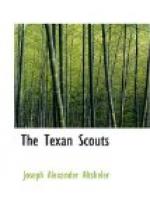“Good old boy! Good fellow!” said Ned, pinching his ear. “We were lucky, you and I, to find this place.”
The horse neighed ever so gently, and rubbed his nose up and down. After a while the darkness began to increase. Ned knew that it was not a new development of the storm, but the coming of night, and he grew anxious again. He and his horse, however secure at the present moment, could not stay always in that dip among the bushes. Yet he did not dare to leave it. Above on the plain they would receive the full sweep of the wind, which was still bitterly cold.
He was worn by the continued buffetings of blast and snow, but he did not dare to lie down, even in the blankets, lest he never wake again, and while he considered he saw darker shadows in the darkness above him. He gazed, all attention, and counted ten shadows, following one another, a dusky file. He knew by the set of their figures, short and stocky, that they were Mexicans, and his heart beat heavily. These were the first Mexicans that any one had seen on Texan soil since the departure of Cos and his army on parole from captured San Antonio. So the Mexicans had come back, and no doubt they would return in great force!
Ned crouched lower, and he was very glad that the nose of the horse was still under his arm. He would not have a chance to whinny to his kind that bore the Mexicans. But the horse made no attempt to move, and Ned watched them pass on and out of sight. He had not heard the sound of footsteps or voices above the wind, and after they were gone it seemed to him that he had seen a line of phantoms.
But he was sure that his own mortal eyes had beheld that for which he was looking. He and his comrades had been watching the Rio Grande to see whether the Mexicans had crossed, and now he at least knew it.
He waited patiently three or four hours longer, until the wind died and the fall of snow ceased, when he mounted his horse and rode out of the dip. The wind suddenly sprang up again in about fifteen minutes, but now it blew from the south and was warm. The darkness thinned away as the moon and stars came out in a perfect sky of southern blue. The temperature rose many degrees in an hour and Ned knew that the snow would melt fast. All danger of freezing was past, but he was as hungry as a bear and tired to death.
He unwrapped the blankets from his body, folded them again in a small package which he made fast to his saddle, and once more stroked the nose of his horse.
“Good Old Jack,” he murmured—he had called him Old Jack after Andrew Jackson, then a mighty hero of the south and west, “you passed through the ordeal and never moved, like the silent gentleman that you are.”
Old Jack whinnied ever so softly, and rubbed his nose against the boy’s coat sleeve. Ned mounted him and rode out of the dip, pausing at the top of the swell for a long look in every direction. The night was now peaceful and there was no noise, save for the warm wind that blew out of the south with a gentle sighing sound almost like the note of music. Trickles of water from the snow, already melting, ran down the crests. Lighter and lighter grew the sky. The moon seemed to Ned to be poised directly overhead, and close by. New stars were springing out as the last clouds floated away.




